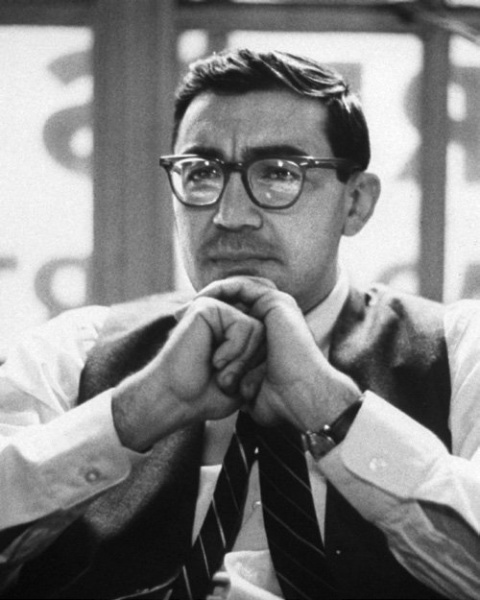Columbia College | Columbia University in the City of New York
William F. Haddad ’54, JRN’54, Journalist, Politician, Crusader

TED RUSSELL / GETTY IMAGES
As a journalist, he helped bring down New York power broker Robert Moses and founded a weekly newspaper, the Manhattan Tribune, with Roy Innis, national director of the Congress of Racial Equality. As a politician, he advised many office holders, including Estes Kefauver, Robert F. Kennedy and Mario M. Cuomo. As an activist, he was the first inspector general of the Peace Corps, spearheaded the sale of generic drugs and helped bring a ordable AIDS medication to Africa. As a businessman, he was marketing director for John DeLorean, the charismatic carmaker whose company would implode due to DeLorean’s corruption.
In his heart, Haddad considered himself a crusader. “I’m a provocateur,” he once said. “I learned that from Estes Kefauver. I used to ask him, ‘Why do you get into all these battles?’ and he would say, ‘Never let one go by.’ I wish I could. I wish I could learn to keep my mouth shut. But I can’t.”
Haddad died on April 30, 2020, in Poughquag, N.Y. He was 91.
Born on July 25, 1928, in Charlotte, N.C., Haddad lied about his age so he could join the Merchant Marine at 15 and served aboard cargo ships in the Pacific during WWII. While at the College, he simultaneously earned a master’s from the Journalism School.
He joined Kefauver’s staff in 1954 and helped to secure his nomination as Adlai Stevenson’s vice-presidential running mate in 1956. Haddad then became a reporter at the New York Post, where, along with other reporters, he linked Moses to paybacks, financial corruption and organized crime, leading to Moses’s downfall after more than 40 years as the city’s most powerful politician. Haddad received a George Polk Award, one of journalism’s highest honors, in 1958, and shared another in 1959.
In 1961, Haddad became a top assistant to R. Sargent Shriver, founding director of the Peace Corps, and was its associate director and first inspector general. A friend of the Kennedys, he made an unsuccessful bid for a seat in the U.S. House of Representatives in 1964 and never ran for office again, but advised on RFK’s 1968 presidential campaign and managed Cuomo’s victorious 1982 New York gubernatorial campaign.
In the 1970s, Haddad taught at Sarah Lawrence, returned to the New York Post, worked for DeLorean for two tumultuous years, chaired a state panel on education and directed the State Assembly’s office of legislative oversight and analysis, where he investigated corruption in banking. In 1974, he persuaded the legislature and Gov. Hugh L. Carey to let doctors prescribe generic drugs in place of higher-priced brand names. A decade later, he took his campaign nationwide and was instrumental in shepherding landmark legislation that removed longstanding legal and regulatory hurdles to the manufacture and sale of generic drugs.
Haddad devoted the latter part of his career to lowering the cost of drugs used to treat HIV/AIDS in Africa and elsewhere. In 2001, he worked with Cipla, a drug company in India, to make way for the use of generic AIDS medicines and to reduce the price of lifesaving drug cocktails.
Haddad’s marriages to Kate Roosevelt, a granddaughter of President Franklin D. Roosevelt, and Noreen Walsh ended in divorce. He is survived by his daughters from his first marriage, Laura Whitney-Thomas, Andrea and Lulie; children from his second marriage, Amanda Reina and Robert; stepson, Steve Walsh; 13 grandchildren; and two great-grandsons.
— Alex Sachare ’71
Issue Contents
Published three times a year by Columbia College for alumni, students, faculty, parents and friends.
Columbia Alumni Center
622 W. 113th St., MC 4530, 6th Fl.
New York, NY 10025
212-851-7852
cct@columbia.edu
Columbia Alumni Center
622 W. 113th St., MC 4530, 4th Fl.
New York, NY 10025
212-851-7488
ccalumni@columbia.edu

